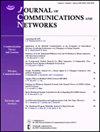Bandit learning based stable matching for decentralized task offloading in dynamic fog computing networks
IF 3.2
3区 计算机科学
Q2 COMPUTER SCIENCE, INFORMATION SYSTEMS
引用次数: 0
Abstract
This paper deals with the task offloading problem in the dynamic fog computing networks (FCNs) that involves the task and resource allocations between a set of task nodes (TNs) having task computation needs and a set of helper nodes (HNs) having available computing resources. The problem is associated with the presence of selfishness and rational nodes of these nodes, in which the objective of TNs is to minimize the task completion time by offloading the tasks to the HNs while the HNs tend to maximize their monetization of task offloading resources. To tackle this problem, we use the fairness and stability principle of matching theory to assign the tasks of TNs to the resources of HNs based on their mutual preferences in a decentralized manner. However, the uncertainty of computing resource availability of HNs as well as dynamics of QoS requirements of tasks result in the lack of preferences of TN side that mainly poses a critical challenge to obtain a stable and reliable matching outcome. To address this challenge, we develop the first, to our knowledge, Thompson sampling based multi-armed bandit (MAB) learning to acquire better exploitation and exploration trade-off, therefore allowing TNs to achieve the informed preference relations of HNs quickly. Motivated by the above considerations, this paper aims at design a bandit learning based matching model (BLM) to realize the efficient decentralized task offloading algorithms in the dynamic FCNs. Extensive simulation results demonstrate the potential advantages of the TS based learning over the ε-greedy and UCB based baselines.基于匪徒学习的稳定匹配,用于动态雾计算网络中的分散任务卸载
本文讨论的是动态雾计算网络(FCN)中的任务卸载问题,该问题涉及一组有任务计算需求的任务节点(TN)和一组有可用计算资源的辅助节点(HN)之间的任务和资源分配。该问题与这些节点的自私和理性节点的存在有关,其中 TN 的目标是通过将任务卸载给 HN 来最小化任务完成时间,而 HN 则倾向于最大化任务卸载资源的货币化。为了解决这个问题,我们利用匹配理论的公平性和稳定性原理,以分散的方式将 TN 的任务分配给 HN 的资源。然而,由于 HN 计算资源可用性的不确定性和任务 QoS 要求的动态性,导致 TN 端缺乏偏好,这对获得稳定可靠的匹配结果提出了严峻挑战。为了应对这一挑战,我们开发了我们所知的第一个基于汤普森采样的多臂匪徒(MAB)学习,以获得更好的开发和探索权衡,从而使 TN 能够快速获得 HN 的知情偏好关系。基于上述考虑,本文旨在设计一种基于匪学习的匹配模型(BLM),以实现动态 FCN 中高效的分散任务卸载算法。广泛的仿真结果表明了基于 TS 的学习相对于基于 ε-greedy 和 UCB 的基线的潜在优势。
本文章由计算机程序翻译,如有差异,请以英文原文为准。
求助全文
约1分钟内获得全文
求助全文
来源期刊
CiteScore
6.60
自引率
5.60%
发文量
66
审稿时长
14.4 months
期刊介绍:
The JOURNAL OF COMMUNICATIONS AND NETWORKS is published six times per year, and is committed to publishing high-quality papers that advance the state-of-the-art and practical applications of communications and information networks. Theoretical research contributions presenting new techniques, concepts, or analyses, applied contributions reporting on experiences and experiments, and tutorial expositions of permanent reference value are welcome. The subjects covered by this journal include all topics in communication theory and techniques, communication systems, and information networks. COMMUNICATION THEORY AND SYSTEMS WIRELESS COMMUNICATIONS NETWORKS AND SERVICES.

 求助内容:
求助内容: 应助结果提醒方式:
应助结果提醒方式:


